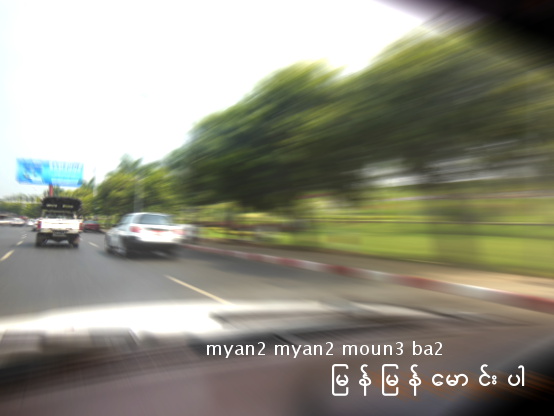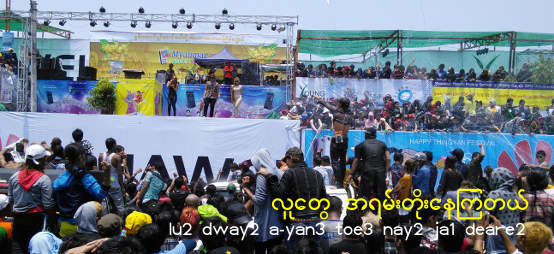"How" and "When" Parts of Action Words - Burmese Adverbs
Imagine yourself driving a red Ferrari down the long and winding mountain road. Suddenly, at the steep corner turn, you lost control, and you find yourself in the clouds. You quickly press the emergency button with your shaken hand, and the parachute opens. As you take a deep breath, you see the blue mountain behind the clouds in your rear-view mirror. You will now never forget the meaning of MOUN3, (to drive) on the MOUNtain road.
That's a memory technique where you are learning to associate the word MOUN3 with MOUNtain. Here is a video clip with less power than a red Ferrari.
DriveImagine yourself driving a red Ferrari down the long and winding mountain road. Suddenly, at the steep corner turn, you lost control, and you find yourself in the clouds. You quickly press the emergency button with your shaken hand, and the parachute opens. As you take a deep breath, you see the blue mountain behind the clouds in your rear-view mirror. You will now never forget the meaning of MOUN3, (to drive) on the MOUNtain road. That's a memory technique where you are learning to associate the word MOUN3 with MOUNtain. Here is a video clip with less power than a red Ferrari. [28 seconds]
Posted by Naing Tinnyuntpu on Monday, May 16, 2016
Verbs in the previous lesson are quite useful in telling others what you want to do. But, sooner or later you discover that you still
cannot communicate what you really want to say. Something seems to be missing. For example, you need to go to the embassy in a hurry. You know the words
thwa3
![]() — go, and
— go, and
moun3 ![]() — drive.
— drive.
You have memorized some useful nouns such as
thun2-yone3
![]() — embassy.
— embassy.
In addition, you know the general formula for constructing a sentence which says you want to do something:
xxxx chin2 deare2
— I want to xxxx.
So, you can tell the driver:
thun2-yone3 thwa3 chin2 deare2
I want to go to the embassy.
You can follow up with the order:
moun3 — drive!
or using the softer tone:
moun3 ba2 — Please drive!
You still find the sentence unsatisfactory because you have expressed only half of what you really want to say: You are in a hurry. You want him to drive fast.
thun2-yone3 a-myan2 thwa3 chin2 deare2
I want to go to the embassy fast.
(embassy + quickly + go + want + affirmative)

myan2-myan2 moun3 ba2 — Please drive fast!
The five types of Burmese Adverbs
The Adverb in the Burmese grammar has a Pali origin, and is known as
ka1-ri1-ya2 we1-thay2-tha1-na1.
![]()
The word
ka1-ri1-ya2
refers to the action words (verbs), and
we1-thay2-tha1-na1
means to modify or to qualify. Burmese adverbs qualify the verbs similar to English. There are five types of Burmese Adverbs:
-
Words that describe "how" part of the action words known as a-mu2-a-ya2 pya1 ka1-ri1-ya2 we1-thay2-tha1-na1 belong to a type of Myanmar adverbs that show gestures, manner, facial expressions, and behavior of human and other living beings.
Examples:
yo2-yo2 thay2-dthay2 kine2 ba2 — Please handle with care.
hnay3-hnay3 kway3-kway3 - sluggishly.
wone3-wone3 dine3-dine3 - noisily.
-
Myanmar grammar put the conditions of things such as road conditions affected by the heavy storm in a different classification of adverbs. It is called a-chay2-a-nay2 pya1 ka1-ri1-ya2 we1-thay2-tha1-na1.
Examples:
thut-thut-yut-yut — neatly
— neatly
pfa1-yo2 pfa1-yeare3 — in disarray; in disorder
— in disarray; in disorder
Examples in complete sentences:
mo3 a-kji3 a-kjeare2 ywa2 nay2 deare2
Rain is pouring down heavily.
teare3-boat dway2 pfa1-yo2 pfa1-yeare3 pfyit kone2 byi2
Huts are in disarray.
-
Another type of Burmese adverb known as a-chain2 pya1 ka1-ri1-ya2 we1-thay2-tha1-na1 shows time or "when" part of action words:
a-khu1 thwa3 — Go now!
— Go now!
Note that this adverb time word a-khu1 can also be a noun a-khu1 to say "just now".
More examples of adverbs that show time in relation to the action words (verb):
a-khu1 thwa3 dau1 meare2 — I am about to go now.
kha1-na1 nay2 sa3 ja1 meare2 — We shall eat in a while.
-
a-may3 ka1-ri1-ya2 we1-thay2-tha1-na1 are interrogative adverbs such as "when" and "how" questions in relation to the verbs.
Examples:
beare2-lo2 thwa3 ma1-leare3 — How will you go?
— How will you go?
beare2-dau1 thwa3 ma1-leare3 — When will you go?
— When will you go?
-
The fifth type of Burmese adverbs known as pa1-ma2-na1-pya1 ka1-ri1-ya2 we1-thay2-tha1-na1 shows the magnitude or size.
Examples:
a-loon2 — extremely, very
— extremely, very
mya3-mya3 — abundantly
— abundantly
neare3-neare3 — just a little
— just a little
a-kone2 — all
— all
lone3-wa1 — none
— none
Examples in complete sentences:
lone3-wa1 dtha1-bau3-ma1-tu2 bu3 — I absolutely disagree.
a-neare3-ngeare2 dtha2 hteare1 — Just put a little.
Adverb example in a song
The song in the video clip below used the adverb da1-jain2-ta1-kha2 meaning once in a while.
da1-jain2 ta1-kha2 — once in a while (adverb)
dtha2 — only (particle)
ya1 — have (verb)
dthau3 — (particle) convert the clause into adjective to mean "rare"
pweare3 dau2 — festive occasion (noun)
a-tu2-du2 — together (adverb)
pyau2 — be happy (verb)
da1-jain2 ta1-kha2 dtha2 ya1 dthau3 pweare3 dau2 a-tu2-du2 pyau2
We have this festival only once in a while. Let's be happy together.
Once in a while onlyWe have this festival only once in a while. Let's be happy together. [29 seconds] da1-jain2 ta1-kha2 - once in a while (adverb) dtha2 - only (particle) ya1 - have (verb) dthau3 - (particle) convert the clause into adjective to mean "rare" pweare3-dau2 - festive occasion (noun) a-tu2-du2 - together (adverb) pyau2 - be happy (verb)
Posted by Naing Tinnyuntpu on Saturday, May 14, 2016
More Burmese Adverb Examples
Now, we will add adverbs to the verbs we have met in the previous lesson. The following are mixtures of complete sentences, verbal commands, suggestions and phrases. They are organized in the same sequence as in lesson 7.
a-mya3-ji3 sa3 — Have your fill of the stomach!; eat
a lot. (a lot + eat)
chet-chin3 thwa3 — Go immediately! (immediately + go)
koun3-koun3 loat — Do it nicely! (good + good + do)
myan2-myan2 pyay3 — Run quickly! (quick + quick + run)
a-thay2 cha1 — Attack!; Charge!; fight till the death! (deadly + fight)
hmun2-hmun2 la2 ba2 — Please come regularly. (regularly + come + suggestion)
You will note that many of those Burmese adverbs are formed by doubling of words. For example, koun3 means good (adjective), and koun3-koun3 means nicely (adverb), or in a good manner.
Those double-word adverbs are frequently used in spoken form and they are further classified as hna1-kjain2-htut ka1-ri1-ya2 we1-thay2-tha1-na1 in Burmese grammar, which means "two-times-repeat adverbs".
Busy Street Activities
thate — so much (adverb)
ku2 — help (verb)
chin2 — want to (particle used as verb suffix to mean "ku2-chin2" - want to help)
da2 — modifies "want to help"(verb) to "the thought that wants to help" (noun)
beare3 — emphasis ending word: "exactly! (particle)
thate ku2 chin2
da2 beare3
I want to help so much.
ko3-lo3 kun1-lun1 ma1-yut neare1
Don't park obstructively; Don't obstruct the traffic.
(obstructively + negative prefix particle + stop or park + negative imperative)

lu2-dway2 — people (human + plural)
a-yan3 — too much (adverb)
toe3 — push and shove (verb)
nay2 — particle equivalent to present participle "ing"
ja1 — particle that modifies the verb "to push" to plural
deare2 — affirmation ending word (postpositional marker)
lu2-dway2 a-yan3 toe3 nay2 ja1 deare2
There's too much shoving and pushing going on.
pfyay3-byay3 hsoat — Back up slowly.
(slow + slow + back up or reverse the car)
khut myan2-myan2 kway1 — Turn quickly
(rather + quick + quick + turn)
thay2-dthay2 cha2-ja2 kji1 — Look carefully!
(surely + look or watch)
neare3-neare3 beare3 weare2 — Buy a little only.
(a little + only + buy)

sate-shay2 let-shay2 kji1 pyi3 ku3
- Cross the road patiently with caution.
(patiently + look + afterwards + cross the road)
Cleaning up
a-woot myan2-myan2 shau2
Wash your clothes quickly! (clothes + quickly + to wash)
yay2 ga1-bya2 ga1-ya2 cho3
take a shower in a hurry. (water + in a hurry + bathe)
a-khan3 thwet-thwet let-let shin3
Clean up the room briskly! (room + briskly + to tidy-up)
When you are sick
hsay3 hmun2-hmun2 thout ba2
Please take your medicine regularly.
(medicine + regularly or correctly without fault + to drink + suggestion)
In Burmese, the word thout (to drink) is used for "taking" medicine in both liquid and tablet forms.
hsa1-ya2-woon2 ta1-kha2 deare3 khau2 lite
Call the doctor at once!
(doctor + at once; immediately + call + emphatic suggestion)
Waking up in the morning
ate-ya2 sau3-zau3 hta1 ba2
Please wake up early!
(bed + early + wake up (or) stand upright + suggestion)
Preparing to go to work
mate-kut hla1-hla1 pa1 pa1 lain3
Put on the make-up (beautifully); put on cosmetics to make oneself attractive and beautiful.
(cosmetic + beautifully + rub)
Morning Rush Hour
ma1-net tine3 — every morning (morning [noun] + every [particle])
a-loat — work (noun)
sau3-zau3 — early (adverb)
thwa3 — go (verb)
deare2 — affirmation ending word (postpositional marker)
ma1-net tine3 a-loat sau3-zau3 thwa3 deare2
[he, she, I] go(es) to work early every morning.
but-sa1-ka3 — bus (noun)
a-kja2-ji3 — for a long time (adverb)
soun1 — wait (verb)
nay2 ya1 — had to (particle)
deare2 — affirmation ending word. (postpositional marker)
but-sa1-ka3 a-kja2-ji3 soun1 nay2 ya1 deare2
I had to wait for the bus for a long time.
At Work
a-loat kjo3-jo3 za3-za3 loat ba2
Work diligently.
(work [noun] + diligently + work [verb] + polite suggestion)
za1-ga3 cho2-cho2 tha2-dtha2 pyau3 tut deare2
(She) can speak pleasantly; Her speech is pleasant to hear.
(speech + pleasantly + speak + able to + ending affirmation)
a-loat ma1-pyet ma1-kwet tet ba2
Please show up for work without fail.
(work + without fail + attend + polite suggestion)
kjeare2-jeare2 pyau3 ba2
Please speak louder!
(loudly or louder + speak + suggestion)
a-chain2 — time (noun)
thate — too much (adverb)
ma1 — not (particle)
pfyone3 — to waste (verb)
ba2 — polite emphasis (particle)
neare1 — negative imperative (particle)
a-chain2 thate ma1-pfyone3 ba2 neare1
Don't waste too much time!
Lunch Hour
let kja1 kja1 na1 na1 hsay3
Wash your hands properly!
(hand + good + properly + to wash)
Although let is a singular form meaning hand, it is understood to refer to both hands of a single person. The plural let dway2 refers to hands of many people. (See lesson 32 for singular and plural terms.)
kha1-na1 ta1-pfyoat a-na3 yu2 meare2
I am going to take a short rest!
(momentarily + a rest [noun] + to take + going to)
Near the end of Shift
na2-yi2 ma1-kja2 kha1-na1 kji1
Watch the clock every now and then.
(clock or watch + not + take a long time + again and again + to look or to glance)
This word is interesting. ma1-kja2 kha1-na1 is a coined word using
ma1-kja2
which means not + take a long time, and
kha1-na1 kha1-na1
which means again and again. So,
ma1-kja2 kha1-na1 means you do something again and again before a long time. The appropriate English translation is every now and then.
End of Shift
a-khu1 beare3 a-loat hsin3 deare2
I just finished work, as in "the shift is just over."
(now + just + work + go down + affirmation)
Back home
ain2 — house or home (noun)
chau3-chau3 moon2 moon2 — smoothly; smooth-sailing without obstacles on the way (adverb)
pyan2 yout la2 — return (verb) (return + arrive + suffix "come")
byi2 — ending word "has/have" (postpositional marker)
ain2 chau3-chau3 moon2 moon2 pyan2 yout la2 byi2
[He, she, I] has/have come back home safely!
pfa1-nut — shoes, slippers, footwear (noun)
go2 — to (postpositional marker that makes slipper the "object" of the sentence.)
de2 hma2 — here (pronoun + postpositional marker)
thut-thut yut-yut — neatly (adverb)
choot — remove from body; take off (verb)
ba2 — polite ending word (particle)
pfa1-nut go2 de2 hma2 thut-thut yut-yut choot ba2
Please remove your shoes neatly here.
Time to cook
hta1-min3 ga1-mun3 ga1-dun3 chet
Cook rice in a rush.
(rice + in a rush + to cook)
hin3 — dishes such as fish, meat, chicken, and vegetable to be eaten with rice (noun)
dway2 — (particle that makes the noun plural)
pfyit ga1-dut-hsun3 — carelessly; not properly done (adverb)
ma1 — negative (particle)
chet — cook (verb)
ba2 — polite word (particle)
neare1 — negative imperative telling not to (particle)
hin3 dway2 pfyit ga1-dut-hsun3 ma1-chet ba2 neare1
Please don't anyhow cook the dishes.
Taking a bath
ay3-ay3 hsay3-zay3 goun3 shau2
unhurriedly shampoo the hair.
(unhurriedly + head + wash hair or clothes)
sain2-byay2 na1-byay2 yay2-cho3
leisurely take a bath. (leisurely + bathe)
Washing dishes
ba1-gun2 — plates (noun)
sin2 — be clean; be free from impurities(verb)
oun2 — in order to (conjunction)
thay2-dthay2 cha2-ja2 — thoroughly (adverb)
hsay3 — wash (verb)
ba1-gun2 sin2 oun2 thay2-dthay2 cha2-ja2 hsay3
Thoroughly wash the dishes.
yay2 — water (noun)
lone2 — keep something tight (verb)
oun2 — in order to (conjunction)
beare2-lo2 — how (adverb)
pate — close (verb)
ma1-leare3 — ending question word.
yay2 lone2 oun2 beare2-lo2 pate ma1-leare3
How do I shut the faucet tight so that water will not be dripping?
The word oun2 is a positive word which means "to pass", such as in "to pass the exam" (verb). It can be appended to several other words as conjunction to mean "in order to make it happen". For example, sin2 oun2 means "in order to make it clean", where sin2 means "be spotlessly clean".
Family time
ray2-de2-yo2 — radio
a-kjeare2 ji3 — loudly
na3 htoun2 — listen
ray2-de2-yo2 a-kjeare2 ji3 na3 htoun2
listen to the radio so loudly.
TV
toe3-doe3 — opposite of "loudly"; in low volume
beare3 — only
pfwin1 — open
TV toe3-doe3 beare3
pfwin1
Don't turn on the TV volume so loud; watch TV with low volume
Note that in Burmese, the above sentence is not a negative imperative, but a positive suggestion.
Say your prayers
hsu1 a-myeare3 toun3
Always say your Grace [Christian rituals]
(wish or trophy + always + to ask for)
nya1-dine3 pfa1-ya3
hmun2-hmun2 shit-kho3
Say prayers regularly every night.
(night + every + God or the Buddha or a symbol representing the Buddha + regularly + to pay respect)
Time to sleep
kha1-na1-nay2 ate-chin2 mu3-du3 neare1 mi3 pate meare2
Later on, [I will be] sleepily switching off the light.
(later on + sleepily + with + light or fire + to close + going to)
Take note of the omission of "you" and "I" in the above Burmese phrases. They are implicitly implied and unnecessary in such phrases.
Buying things
pike-hsun2 a-khu1 pay3
Pay me money now! (money + now + to pay)
a-pup-tine3 — every week (week + every)
hmun2-hmun2 — regularly (adverb)
zay3 — market (noun)
weare2 — buy (verb)
deare2 — affirmation (postpositional marker)
a-pup-tine3 hmun2-hmun2 zay3 weare2 deare2
I shop regularly every week.
Myanmar housewives probably shop for dry goods every week. Majority of households in Myanmar buy fresh vegetables and small portions of meat, fish, or chicken almost every day in the neighborhood market. There are also sellers — usually women — going around some neighborhood every morning, each carrying a big basket of grocery items on their heads and crying out the melody of their signature voices.
Adverbs should be studied after the verbs. In Burmese language grammar, particles and postpositional markers are also important because verbs or adverbs alone will not work. Those parts of speech will be discussed later in detail.
